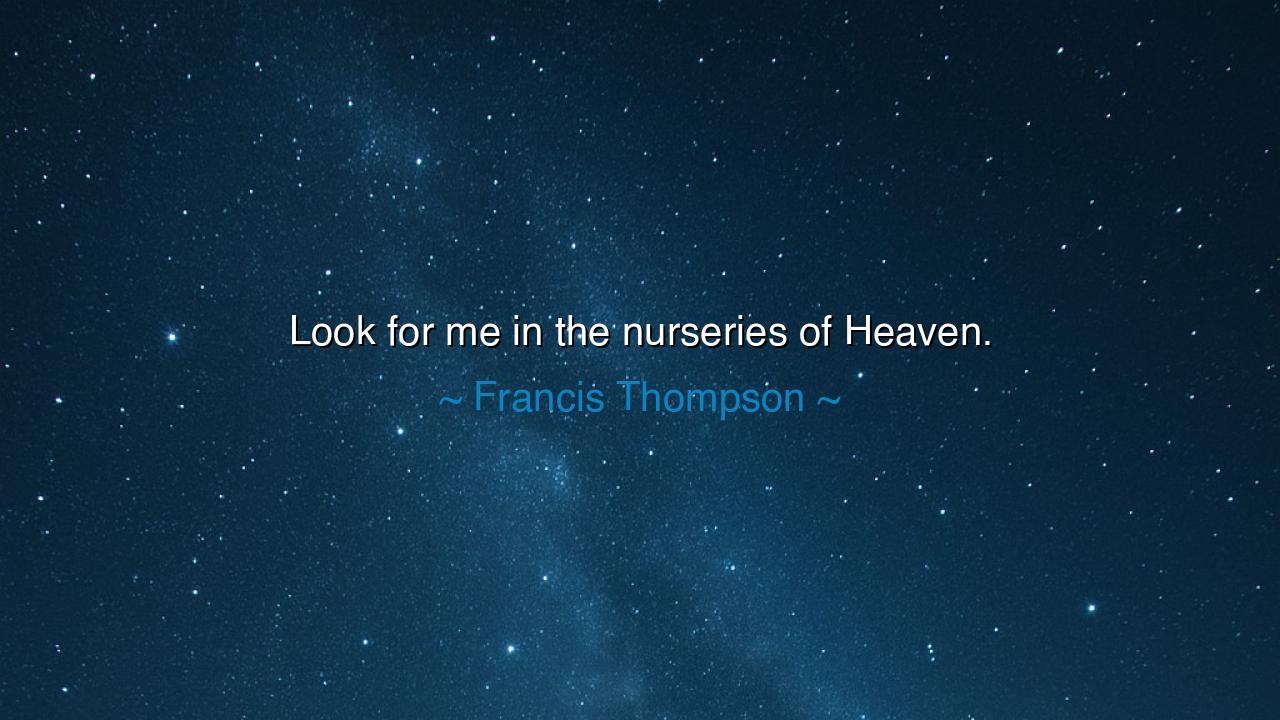
Look for me in the nurseries of Heaven.






When Francis Thompson wrote, “Look for me in the nurseries of Heaven,” he spoke not as a poet of sorrow alone, but as one who had glimpsed eternity through the eyes of suffering and grace. These words, tender and luminous, come to us from a soul both wounded and redeemed—a man who knew despair as few have known it, yet still found within that darkness the faint, golden thread of divine mercy. The nurseries of Heaven—what an image this is! Not the thrones of angels, nor the citadels of glory, but nurseries: places of gentleness, of beginnings, of rebirth. In this phrase, Thompson reveals the heart of his faith—that Heaven is not only a realm of judgment or reward, but a home for broken souls being made whole again, for spirits returning to innocence.
Born in England in 1859, Francis Thompson lived a life of hardship, addiction, and destitution. He wandered the streets of London, homeless and forgotten, his genius nearly consumed by poverty and opium. Yet through all his wanderings, a divine pursuit followed him—the love of God that he would later immortalize in his great poem “The Hound of Heaven.” It was this same love that, when he finally surrendered to it, transformed his despair into vision. To say “Look for me in the nurseries of Heaven” is his way of saying: “If I am not among the saints and scholars, do not think me lost. Seek me where mercy dwells. Find me among the children of renewal, learning again the language of light.” It is the cry of a penitent who has been found by love.
In the nurseries of Heaven, the soul is reborn—not in flesh, but in purity. Thompson, who had lost his way on earth, imagined himself in the afterlife as a child once more, being nurtured by divine hands. This vision reflects a truth long held by mystics: that death is not the end, but a return—a passage into the embrace of that which is infinitely tender. The nursery, unlike the throne room or the battlefield, is a place of trust and quiet growth. It is where the weary are healed, where the lost are taught again how to live in light. In saying that we should look for him there, Thompson invites us to see redemption not as triumph, but as restoration—the soul’s return to innocence after the long exile of sin.
This idea of spiritual rebirth has appeared throughout the ages. Consider the story of Saint Augustine, who in his youth chased worldly pleasures and wandered far from virtue. When he finally turned toward God, his conversion was not that of a warrior finding victory, but of a child coming home. “Our hearts are restless,” he wrote, “until they rest in You.” Augustine’s awakening mirrors Thompson’s vision of the nursery of Heaven: both men saw that divine love does not condemn—it reclaims. The journey of the spirit, with all its struggle and sorrow, leads not to punishment but to transformation, to the tender renewal of what was lost.
In this sense, Thompson’s quote is not only personal—it is universal. We are all wanderers, all prodigal children yearning to return. The nurseries of Heaven represent the mercy that awaits every soul weary from the trials of life. Whether one has failed, despaired, or forgotten the path, there remains in the heart of creation a place of light and learning, where even the most broken can begin anew. Thompson’s hope is not for himself alone—it is for all who have fallen, for all who still long to be held by something greater than themselves.
For those of us who walk still in the world, Thompson’s words carry a living lesson. They remind us to seek the nurseries of Heaven here and now—in kindness, in forgiveness, in every act that restores the innocent and the wounded alike. When we nurture a child, comfort a stranger, or forgive an enemy, we are tending Heaven’s garden on earth. We are, in a small way, helping souls to be reborn in love. The gates of Heaven are not only beyond the stars; they open quietly wherever compassion dwells.
And so, children of the future, remember this teaching: the divine does not look for perfection, but for sincerity. Do not despair of your failures or believe yourself unworthy of light. For even if you lose your way, Heaven’s nurseries are waiting—gentle and patient, like a mother’s arms, ready to teach you how to love again. When your days grow weary and your heart trembles with doubt, think of Francis Thompson’s humble promise: “Look for me in the nurseries of Heaven.” There, beyond sorrow and striving, the soul will not be judged by its scars, but healed by its longing. There, the lost are found, and the broken made whole.






AAdministratorAdministrator
Welcome, honored guests. Please leave a comment, we will respond soon